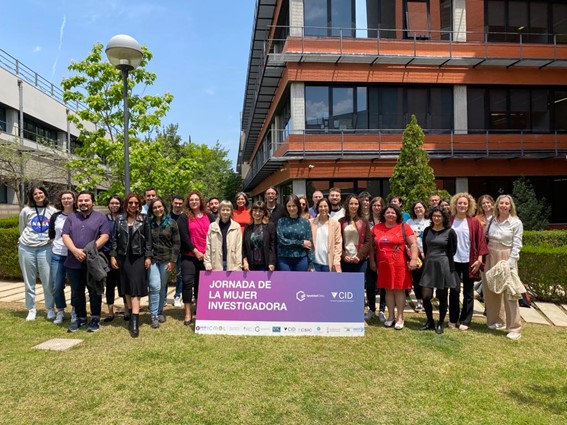The Equality teams of the Institute of Molecular Science (ICMol) and the Institute of Corpuscular Physics (IFIC) held last Friday the seventh edition of the Women Researchers Day, focused on the debate on gender mainstreaming in research projects, framed within the guidelines of the Horizon Europe program of European grants and the European Research Area
The Equality teams of the Institute of Molecular Science (ICMol) of the University of Valencia and the Institute of Corpuscular Physics (IFIC), joint center CSIC-UV, both centers located in the Science Park of the University of Valencia, held this Friday the VII edition of the Women Researchers Day, which this time has focused the debate on the incorporation of the gender perspective in research projects, especially in the guidelines that guide the Horizon Europe program of European grants and the so-called European Research Area.
The vice rector of Innovation and Transfer of the University of Valencia, Rosa Donat, opened the conference accompanied by the director of ICMol, Eugenio Coronado; the director of IFIC, Nuria Rius; the deans of the Faculty of Chemistry, Adela Mauri, and Physics, Jordi Vila, and the director of the Equality Unit of the UV, Rosa Mochales.
In her speech, Donat reviewed with enrollment figures in degrees, masters and doctoral programs the "enormous push" of women, who are already 62% on average on the campuses of the Universitat de València. On the other hand, she wondered why there are still gender gaps in salaries in sectors such as chemistry. In addition, the vice-rector of the UV encouraged to be "ambitious," not only in the development of policies of equal rights in the research career, but in "consolidating" the role of women scientists in the "return" to society of the knowledge generated.
"We must strengthen women's rights, because equality is a right, but we must also be aware that the role of women researchers reinforces and adds value to the transfer of knowledge from academia to society, which is what determines the profitability of the investment made in science," Rosa Donat, Vice Rector for Innovation and Transfer at the University of Valencia.
The director of ICMol, Eugenio Coronado, and the director of IFIC, Nuria Rius, hosted the event, which filled the auditorium of the PCUV. Both recalled historical demands, such as the installation of childcare centers on university campuses, but added a renewed demand: the approval of regulations on teleworking to improve work-life balance.
Coronado celebrated the continuity of this conference, which helps "both to make visible the work of brilliant women in scientific careers, as well as to debate and warn about any obstacles that women may encounter at some point in their careers." Rius considered it "vital that equality policies are incorporated into the daily life of research centers."
The researcher María González Béjar, as spokesperson for the organizing entities, encouraged those present, mostly teachers and senior or trainee researchers, to reflect on the prejudices "that sometimes determine the superiority of men over women." "Today is a good day for each of you to ask yourselves a question: 'What have I done in the last year to improve the situation of women in the research career?'" she shared with the attendees.
The day included a scientific lecture by Anabel Lanterna, a professor at the University of Nottingham, whose career was recognized last year by the Royal Society of Chemistry's Environment, Sustainability and Energy Division. Her talk was entitled "Lighting up the future: heterogeneous photocatalysis for sustainable chemistry." Lanterna also gave details of how the gender dimension is applied in British universities.
Regarding the gender dimension in research projects, the day included two presentations by women specialists. The first was by Jessica Illera Clavijo, a Sociology graduate from the University of Salamanca and representative of the International Projects Office of the Spanish Foundation for Science and Technology (FECYT).
The second was given by Lydia González Orta, PhD in Social Sciences and manager of gender and science projects at FECYT, and manager of projects such as GENDERACTION, GENDERNET Plus or SUPERA and liaison of the European WIDERA program on gender equality policy.
Details were given on how the European Council has designed the new European Research Area (ERA) and the Horizon Europe grant program taking into account the promotion of equality units and plans in the research centers funded, but also measures to integrate the gender dimension in all research.
The "confusion in terms"
Both gave details of how the European Council has designed the new European Research Area (ERA) and the Horizon Europe grant program taking into account the promotion of equality units and equality plans in funded research centers, but also measures to integrate the gender dimension in all that research.
As an example of how the gender dimension should be taken into account in the contents of research projects, they pointed out that until not so long ago osteoporosis was generally considered to be a disease exclusively of "menopausal women" and, therefore, for a long time it was excluded in diagnosis among men. Or the circumstance that the rape of men in wars has never been investigated. "This leads us to biased and erroneous conclusions that are resolved if we apply the gender dimension to the content of the field research.
Both warned of the "confusion" that usually exists between "sex" and "gender" or between "gender dimension and gender balance. Equality, said Illera, "is a cross-cutting principle throughout the Horizon Europe program."
The day closed with a lively round table in which issues such as the training of researchers to avoid falling into "discrimination" in the recruitment process, the possibility of incorporating effective measures of reconciliation among the eligible expenses of the projects or the need to adjust the requirements for women who have slowed down their career because they decided to become mothers were discussed.
Video of the VI edition published on ICMol's YouTube channel.


